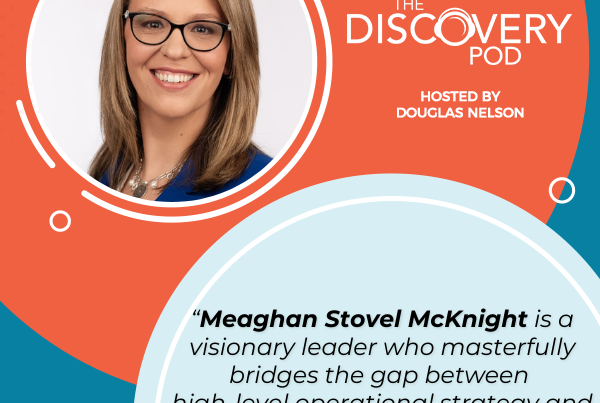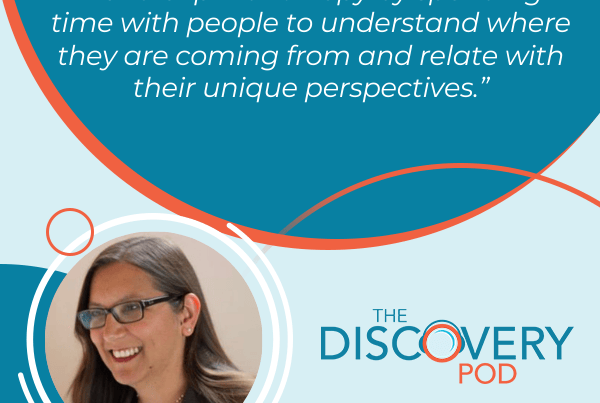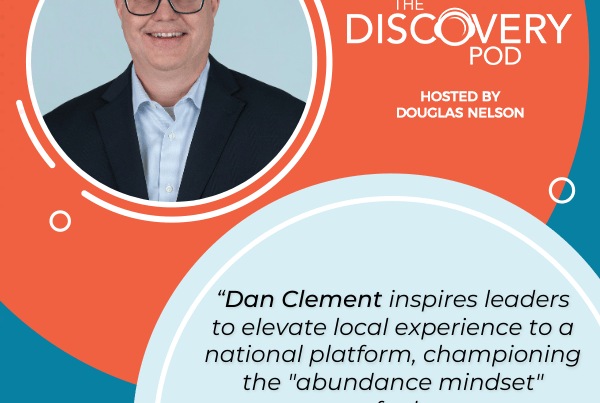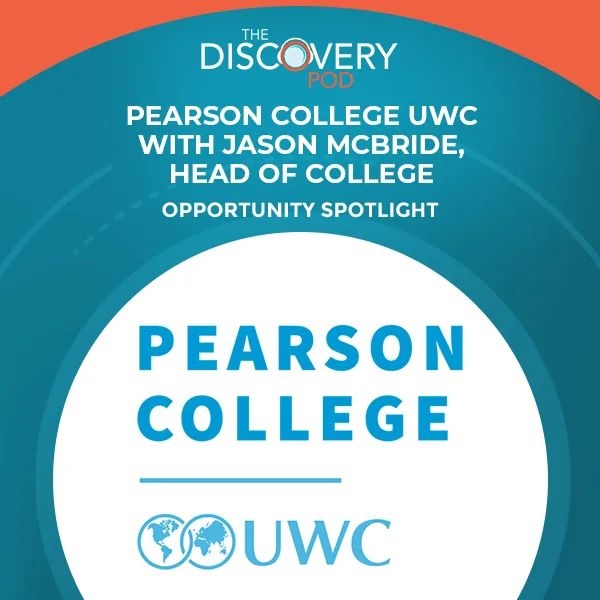
Pearson College UWC is more than an educational institution—it’s a vibrant global community dedicated to fostering peace, sustainability, and opportunity through diversity.
In this Opportunity Spotlight episode, host Christoph Clodius sits down with Jason McBride, Head of Pearson College UWC, to explore how this remarkable institution shapes young leaders from across the globe. Together, they discuss the vital role of the new Director of Advancement and External Relations in advancing the college’s mission and amplifying its global reach.
Discover what sets Pearson College UWC apart in international education as Jason shares powerful insights into crafting transformative student experiences, celebrating cultural diversity, and preparing the next generation of changemakers for a more connected and sustainable future.
Whether you’re an advancement leader or someone passionate about education and global impact, this episode is your gateway to understanding—and possibly joining—a mission that’s truly changing the world.
—
Listen to the podcast here
Pearson College UWC With Jason McBride, Head Of College
Introducing Pearson College And Its Mission
I’m delighted to be speaking with Jason McBride. Jason McBride is the Head of College at Pearson College on beautiful Vancouver Island. We are going to be talking a lot about the Director of Advancement and External Relations role. Jason, welcome to the show.
Thanks so much for having me. It’s wonderful to be here and be your first guest of 2025, I would assume.
You are indeed. Looking forward to starting the year off with a figurative bang. I do want to start and talk about the context of the college itself. Pearson College has a beautiful campus and an incredible institution. For people that may not be familiar with it, let’s start there. Tell me a little bit about the college.
The United World College Movement was founded in 1962. The first college was in Wales, and it was called College of the Atlantic. When our namesake, ex-Prime Minister Pearson visited the Atlantic, he thought, “If we have a College of the Atlantic, we need one as a College of the Pacific.” In 1974, Pearson College became the second UWC to open, and now we are 1 of 18 UWCs around the world, all united around this mission to use education as a force to unite people, nations, and cultures for a more peaceful, sustainable future.
When I first joined the movement several years ago, that mission was brought up so many times that it’s like, “Surely this is a cliché.” Then you get to know the schools and colleges, and you’re like, “There’s a reason everybody has it memorized.” Now we are all united around that mission, eighteen of us around the world, a few thousand students that are all brought in with a focus on deliberate diversity.
We are mostly two-year colleges. It’s the last two years of a high school program where students are aged 16 to 19. It’s a wonderful program to be a part of, and we’ll talk more about the mission along the way, I’m sure because it’s so central to who we are. It’s not a dusty saying on a shelf or in a binder somewhere.
You are coming from campus. You are working on campus right now. I mentioned it’s a beautiful space. I’m enthralled with the space, with the campus but tell me a little bit about the student body. You’ve got so many different nations represented. Tell me a little bit about the dynamic on campus, the student curriculum, the kinds of things they learn, and how they go about learning them.
Diversity And Scholarship Opportunities
There are 210 students right now. We are in 96 nationalities this 2025 across 210. We talk about deliberate diversity, and we mean that in all forms not just in terms of national or cultural, but also through identity. About a third of our students identify as part of the LGBTQ community or two-spirited community, as well, for us in Canada. We are also incredibly diverse socioeconomically, so 50% of our students are on full scholarships, 26% this year are on partial scholarships, and 24% are full fee payers. We have what we believe is the world’s richest scholarship program across the whole model.
It’s quite amazing because what we see is that, around the world, opportunity is not necessarily equally distributed, but talent and ability often are. The UWC movement was founded with this idea to get students into an organization that can help them achieve this mission of making the world more peaceful and sustainable, irrespective of their “lottery at birth,” as it were, socioeconomically.

Pearson College: The UWC movement was founded with this idea to get students into an organization that can help them achieve this mission of making the world more peaceful and sustainable.
I love that mission. I love how compelling that is and how it functions to bring together so many different people to have so many different experiences, learn from each other, and contribute to each other’s learning and growth in so many different ways, too.
In so many ways, our North Star is around communication, alumni engagement, and student recruitment. Our curriculum, and our programming, are all designed around the idea that students are here to learn and practice making the world more peaceful and sustainable, and that happens in a lot of different ways. We run the IB curriculum and we offer the diploma program and the CP program, which is for our Climate Action Leadership diploma, but it goes well beyond that. It goes to things that have been important to us for years, since our founding, around outdoor education and personal challenges. We do that not only because we want our students to experience nature so that they feel compelled to take care of it, but also because in being out on the water, being up the side of mountains, and doing hard things, they learn. They do hard things.
There’s this very cliché quote that isn’t cliché. It’s very meaningful, by Kurt Hahn, who’s the Founder of the UWC movement, and he has this line that we hear about over and over again “There’s more in you than you think.” The only way you get to figure that out is when you do hard things like being home as a 16 or 17-year-old, going to some other part of the world, and participating in something hard and quite transformative.
There’s more in you than you think. The only way you get to figure that out is when you do hard things. Share on XThat’s a great segue. Speaking of transformation, you’ve been an educator for a long time. You’ve spent your career in education in various schools around the world, for that matter. You talked about being a part of the UWC movement for a few years now. What is it that draws you to the UWC movement? What has drawn you to Pearson? Why is it that you do the work that you do, Jason? What do you love most about it?
I was born to a very humble single mom, and me was born and raised in Toronto, in a very diverse part of Toronto. Education for me was the piece that, being lucky enough to be born in Canada, in Ontario, in Toronto, to have good teachers even if my neighborhood was a little rough. That was the game changer for me. Then when I went through teachers’ college and started working internationally, I was in the Middle East for fourteen years and then Southeast Asia for six. Some are small, maybe not so small. Part of me had a little bit of survivor guilt about working in these expensive schools in Dubai and Abu Dhabi, for example. Having this feeling like, “I’m working with the 1%. Nothing wrong with that at all.
We could have an impact at all levels, but I felt like I wanted to be able to give back in a different way. A friend of mine, an ex-colleague he called, was leading the recruitment for the founding head at UWC Thailand. That married my understanding of, or my experience in the international education world, with the opportunity to take, as I said, the world’s most generous scholarship program and marry those two together in Thailand. We were very fortunate to be there and get that school up and running for years.
In the middle of COVID, we had a chance to go to Malaysia to start another UWC. Unfortunately, COVID had different plans for that time and then, towards the back half of COVID, Pearson College happened to be looking for a new head. It aligned with me and my family’s desire to perhaps come back to Canada, have our girls graduate from high school here, and bring all that international experience back to Canada back to our “UWC.” Here we are, halfway through year two, with an eye on being here for many more and a team that wants to be here for many more as well.
I was going to say, that’s a great pivot to looking for the future. Then, as I mentioned, we are going to be working together on, for that matter, the Director of Advancement and External Relations search. What do you think is exciting when we focus on that portfolio specifically? What’s exciting for this new director who’s coming in, thinking about the portfolio? You are building from a successful campaign. I don’t know if you want to talk a bit about that as well, but looking forward to the advancement and external relations piece.
We have had a team here that’s worked hard for a long time. When you are in a fairly small organization, you have to wear a lot of hats. You have to be rolling up your sleeves. It’s not just behind a computer and eating lunch. It’s that, but it is also being willing to get involved in everything because of the real story the real grain in the mill maybe that’s a tough way to talk about students, but the reason we exist is because of our students stories and the people that we bring in year after year, supported by alumni and donors, because these students are incredible. They are chosen from around the world on promise and potential and alignment with this mission, rather than because they are high-achieving or have done this or that.
The Director Role: Storytelling And Leadership
This director role holds three very important portfolios, and all three of those have the opportunity to work well together because they are all involved in storytelling. They are all involved in us talking about why our mission is so important now. It’s not the Cold War anymore, but anti-polarization is so needed in the world, and our model, absolutely focused on building peace, is as necessary now as it was in the 60s, 70s, and 80s. This person coming in should be somebody who’s drawn to the source of the stories and then uses that to tell genuine stories, to pull in to not only reinvigorate our existing donors and alumni but to pull in new people. We know there are hundreds if not thousands, of people who are excited by the mission but don’t know about us.
Our position here, we were saying, the campus is gorgeous and at the southern tip of Vancouver Island. That isolation for us has been a beautiful feature of the program, but in some ways, it’s a bit of a flaw as well. It’s almost a branding problem, if we go to corporate speak a little bit. Telling the stories of this place in order to spread the “brand” is also spreading the impact. It’s about widening the net for students who don’t know that we exist, but whom we would be a great fit for, and who is a great fit for them. There’s a real opportunity here for somebody with the right background to combine all of those storytelling elements around fundraising, communication, and external relations with our alumni and the wider public.
Like you were saying, in your career path, that desire to give back is such an important piece to harness. It’s interesting hearing you talk about isolation being a feature and a flaw because that’s very much the case with your alumni who come to the school from, as you said, 96 countries, and who may go back to those 96 countries as well. You are dealing with a global community on campus, and the reverse is true for the director. They are dealing with a global community out in the world and trying to attract and draw people to the school in their own way fundamentally.
That desire to give back is such an important piece to harness. Share on XIt’s very different. We talked before the show about who might be a good fit for this role. It can be quite wide-ranging. Ideally, it would be somebody who has worked in a youth-centric, opportunity-based organization, but that may not be the case. It’s interesting that for people who have worked at other K to 12 schools, whether independent or public, it’s going to be a bit of an adjustment because we don’t have your typical catchment area. You are not talking to a 10-kilometer radius around the school. Our next student is as likely to come from Lima as they are from Langford. Students can come from all over, and when you have a global group or global stretch like that, that’s exciting and also very new for a lot of people.
Tell me a bit more about why someone would want to come join you now at this stage in their career. What’s exciting about what the college may be doing in the next few years, for that matter? I did mention the campaign. Maybe you want to talk a little bit more about the foundation that this person is building from and the work that you are trying to achieve here, fundamentally.
We closed about months ago. Closed, renewed, and founded the campaign, which was the first of its kind an all-sources, all-amounts campaign that raised over $41 million over the stretch of 6 years. The first time we ran a major campaign like that, even though fundraising has been something that has been endemic to this place since the day it opened, and we are excited about that.
We are mid-campaign. We feel like we are at a place where there are going to be a couple of small to medium-sized projects over the next eighteen months to keep money coming in address some of the things that we need to address, and make sure that we are using that time to also suss out where other major donors might be motivated or other projects that might light a fire under people who are our supporters.
I think we are probably headed in the next few years toward another campaign, which is likely to be very endowment-based. Scholarships that we offer annually are the lifeblood of this school in order for students to be on the scholarship levels that we provide. That endowment is going to continue to be important. That’s likely to be the next focus. Not 100%. The person coming in will have a big say in how they think our community is ready and what they are ready for, but we have a feeling it’ll be in that direction. We are waiting for the next person to come in and help us make that decision.
I was going to say, “The need is fundamentally for a subject matter expert in some ways.” You talked about the three portfolios. They may not necessarily be an expert in all three, but fundraising is probably the most important part of the stool. If it were a three-legged stool in some ways, knowing that they all interact and they all interdepend fundamentally, but it gets down to it. I like that you put that that’s likely the case but this person can come in and do an assessment and figure out the strengths and opportunities of the program and the donor base and the volunteer commitments and things like that as well, fundamentally.
Coming in to figure out the donor base, those early days the first 3 to 6 months it sounds almost cliché to say, “Come in and listen,” and use your 2 degrees in your mouth and the proportion that they are on your head. All of that makes sense, but it is so important for the person coming in to understand. You are going to hear, “We are different.” You don’t feel it until you are on campus talking to a wide range of current students, our faculty, our staff, and our board to hear how deep that difference runs, and to get to know them.
It was a mistake when I first joined UWC back in Thailand to be like, “Same but different.” It’s not different, different but different as well. The motivations are so pure around wanting to make sure that we provide an opportunity for students irrespective of where they were born or what circumstances they were born to bring people in. If you can get excited about that mission, that North Star, you are going to find a real home here.

Pearson College: The motivations are so pure around wanting to make sure that we provide an opportunity for students irrespective of where they were born or what circumstances they were born to bring people in.
We talked mostly about the students. You’ve alluded to the staff, the teachers, and the board members, for that matter. Tell me a bit more about the working culture. What’s it like to work at the school? It’s fundamentally a workplace. We’re looking for professionals. What’s the dynamic like in the room?
Building A Culture Of Doers
The first part is something I alluded to already, which is we have to be a community of doers. We are not big enough and segmented enough so that people don’t roll up their sleeves and get involved. Plus, that’s the beauty of the program getting in on UWC Day and National Days and things like that. It’s wonderful.
Beyond that, I have this quote that I’ve held onto for years from a wonderful trainer that I worked with, Fran Prolman, years ago. She said, “The key to great leadership is building a culture, a work environment where the best idea goes on the table, but people don’t get up on the table with it.” For us, we are looking for the best ideas to help propel us forward. Other than being too caught up in hierarchy about, “It was Jason’s idea,” or “It was Christoph’s idea,” not that fussed. I want to get the best idea.
For us, we have a very open structure. People talk very freely. Ideas can come from anywhere. The more pragmatic side of things is we have a leadership meeting twice a month with the ten department heads that are around the table. I have a one-on-one with the director of AER so that we are there, and we have time to discuss ideas in between those leadership meetings.
The AER team typically meets on Monday afternoons to go through a whip and work in progress and figure out how we are aligned. It’s a nice size that everybody has access to everybody. There are lots of open doors, and we are focused on making sure that the mission happens in a financially sustainable way, rather than who came up with the idea. That’s the people we are looking for.
I love that culture. You want the best outcome, you want the best result, regardless of some not necessarily regardless of how you get there, but where it came from fundamentally. Jason, is there anything else I should have asked about or any final messages you have for potential candidates, curious people, or anybody who wants to know more or is intrigued about you, the college, or this process, for that matter?
I think there’s so much out there on the UWC movement when you start going to dig through what’s on your net and YouTube and all the great content that’s out there. It’s one of those things where when people find out about us, they often go to the next thought, how have I never heard about this before? The great fit for us will be somebody who hears the stories and feels that little tingle in their gut about, “I want to be a part of this.” Not because it’s the job, but because of all the work we do whatever we do, the harder we work, the more opportunity it gets created for students and people who feel that coming out of lots of different industries.
Whatever we do, the harder we work, the more opportunity it gets created for students and people. Share on XThat’s why I said I’m a little agnostic. It doesn’t have to be somebody coming from education, but it has to be somebody who’s driven by mission rather than KPI. Not because we don’t have KPIs and targeting goals of course we do. The world has to move forward financially, but it is going to be somebody who is a storyteller, who wants to engage with the students and the faculty and staff who are very different than you are going to see elsewhere, and then works to help us tell that story so that this place goes on for another 50-plus years. We’ve celebrated our 50th anniversary.
Shaping Future Generations For A Better World
I almost missed that 4 or 5 decades, half a century. The next person to come in is going to help us turn that corner into the next 50. I’m looking forward to making this place as financially solvent as it can be, in order to keep the doors open to all future students, irrespective of their ability to pay. That’s who we are looking for.
That’s so exciting. That tingle, as you say, in the 50th. I understand you’ve got some big reunions, the 50th class reunion this summer coming up. Lots of activities on the go to help leverage some of these opportunities at the risk of being too mechanistic or too practical. These are some of the opportunities for the new director to step into fundamentally too.
We have a 20th, 30th, and 50th coming up this summer by August.
There we go. Your summer’s spoken for then, I suppose. No getting away from you.
You don’t have to travel in order to meet hundreds of alumni. We are bringing them to us. It’s a wonderful happenstance.
You’ve got such a great website, Jason. There are so many of those great stories, so many great alumni stories, and compelling pieces on your website. I’d certainly encourage anyone who wants to learn more about the movement, the UWC movement, the college specifically. I’d highly recommend they check that out for sure. As you were saying at the beginning, it’s such a key piece to learn about if you may not be familiar with it.
I joke sometimes. I’m sure I have joked with you, that in some ways my role is a little bit marketing to get people to understand about the organization before we get into the specifics of the role because, as you said, we want someone that’s mission-driven. We want someone excited and keen and very compelled by the important work you are doing and the great minds, bodies, and intellects that you are shaping fundamentally.
It’s a pretty compelling mission. I hate to use the word different again because it sounds cliché after a while. It is quite a compelling organization to work for. We are looking for somebody to be the chief storyteller along with me. The head of the college and the director of advancements are your chief storytellers. We are looking for a partner that can be a co-chief storyteller.
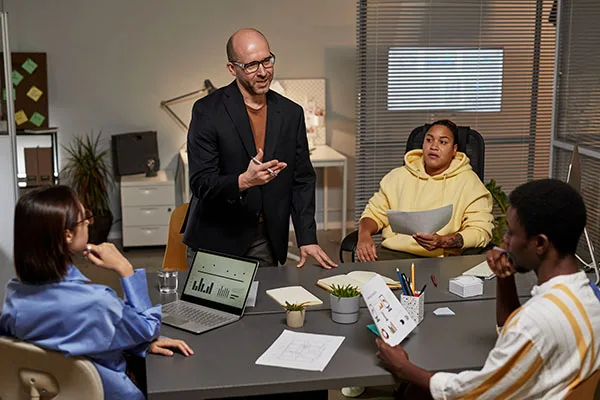
Pearson College: We are looking for a partner that can be a co-chief storyteller.
This has been a very compelling conversation, as always, Jason. I appreciate your time and your passion. It certainly comes across. I would encourage anybody interested or curious to again reach out, learn more about Pearson, learn more about the posting, or reach out to me at my Email. Happy to field inquiries and applications, and looking forward to having some candidate conversations with you and them, for that matter, and getting some people out to campus to learn more about it.
Thanks so much for the opportunity and happy New Year once again.
Not at all. My pleasure, and we’ll chat soon.
Take care.
Thanks.

